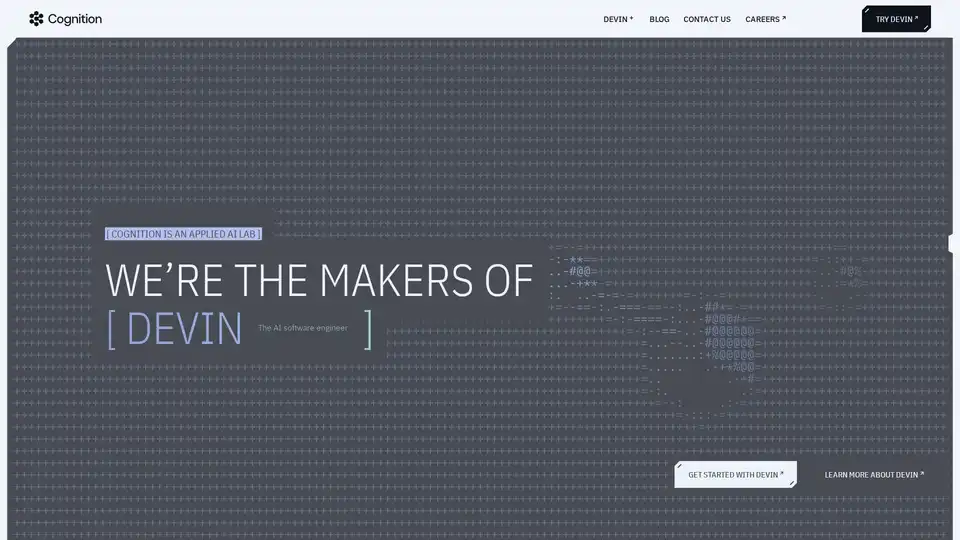
Devin
Overview of Devin
What is Devin?
Devin is the groundbreaking AI software engineer developed by Cognition, an applied AI lab dedicated to shaping the future of software engineering. As a collaborative AI teammate, Devin empowers ambitious engineering teams to accomplish more by automating complex tasks in coding, debugging, and beyond. Unlike traditional tools that offer mere code suggestions, Devin acts as a full-fledged engineer, capable of planning, executing, and iterating on software projects independently. This makes it a game-changer for developers seeking to streamline workflows and focus on high-level innovation rather than repetitive grunt work.
Cognition positions Devin as the first of its kind—a reasoning AI that can handle end-to-end software development challenges. From the company's blog posts, it's clear that Devin leverages advanced models like Claude Sonnet 4.5 to rebuild and enhance its capabilities, addressing real-world hurdles in AI coding agents. Whether you're migrating CI/CD pipelines from Jenkins to GitHub Actions or building custom data analysts, Devin delivers tangible results that accelerate project timelines.
How Does Devin Work?
At its core, Devin operates as an autonomous agent within a virtual development environment. It uses a combination of natural language understanding, code generation, and execution to tackle tasks. For instance, when assigned a project, Devin can browse documentation, write code, run tests, and even debug issues—all while maintaining a persistent workspace that remembers previous actions. This persistent state is powered by innovative file formats like Blockdiff, which Cognition developed for efficient VM disk snapshots, ensuring seamless handling of large-scale codebases.
The workflow typically starts with a high-level prompt from the user, such as 'Build a data analyst tool for sales forecasting.' Devin then breaks it down into subtasks: researching requirements, selecting tech stacks, implementing features, and optimizing performance. Recent updates, like the Devin Agent Preview with Sonnet 4.5, introduce enhanced reasoning for complex, multi-step problems, making it adept at handling enterprise-scale deployments. Cognition's engineering team emphasizes lessons from rebuilding Devin, highlighting challenges like long-context reasoning and tool integration, which have been refined for reliability.
Integration is straightforward via the Devin platform, where users can access it through a web interface. Enterprise features include customizable MCP (Modular Compute Platform) marketplaces for tailored tools, and it's designed to scale across teams, as seen in case studies like Eight Sleep's use of Devin for data analysis.
Key Features of Devin
Devin stands out with a suite of powerful features tailored for modern software engineering:
- Autonomous Coding and Debugging: Devin writes, tests, and fixes code in real-time, reducing errors and speeding up iterations. It's particularly strong in languages like Python, JavaScript, and more, with built-in support for popular frameworks.
- Data Analysis Capabilities: As demonstrated in Cognition's blog, Devin excels as an AI data analyst. It can process datasets, generate insights, and even build dashboards—ideal for teams without dedicated analysts.
- CI/CD Migration and Automation: Guides and tools for large-scale migrations, such as from Jenkins to GitHub Actions, help enterprises modernize their pipelines without downtime.
- Collaborative Teammate Mode: Unlike solo tools, Devin works alongside humans, offering explanations, seeking clarifications, and integrating feedback to align with team standards.
- Enterprise-Grade Security and Scalability: Compliant with platform terms, privacy policies, and acceptable use guidelines, ensuring safe deployment in sensitive environments.
These features are backed by Cognition's talent-dense team, including IOI gold medalists and experts from Google DeepMind, Scale AI, and more, ensuring cutting-edge performance.
How to Use Devin?
Getting started with Devin is user-friendly and accessible via the Cognition website. Here's a step-by-step guide:
- Sign Up and Try It: Visit the 'Try Devin' section to access a free preview or demo. No heavy setup required—just input your task in natural language.
- Define Your Project: Provide specs, like 'Analyze customer data for trends' or 'Migrate our build system.' Devin will outline a plan and execute it step-by-step.
- Monitor and Collaborate: Watch Devin in action through its interface, intervene if needed, and review outputs like code commits or reports.
- Scale for Enterprise: For teams, explore pricing plans that include dedicated support, custom integrations, and deployment options. Contact the team for tailored setups.
- Leverage Resources: Dive into the blog for tutorials, such as 'Build Your Own AI Data Analyst' or 'Coding Agents 101,' to maximize value.
Users report significant time savings; for example, Eight Sleep's Technical Chief of Staff, Andrew Foong, shared how Devin handled data tasks that would take hours manually, freeing engineers for strategic work.
Why Choose Devin?
In a crowded field of AI coding assistants, Devin differentiates itself through its agentic approach—it's not just a completer but a proactive engineer. Backed by Cognition's recent funding and acquisitions like Windsurf, the tool is poised for rapid evolution. It addresses pain points in software development, from talent shortages to slow debugging, delivering ROI through faster releases and reduced costs.
Compared to competitors, Devin's ability to handle full projects (e.g., end-to-end app development) and integrate with enterprise tools like GitHub sets it apart. Blog insights reveal its growth trajectory, including marketplace expansions for custom agents, making it future-proof for AI-driven engineering.
Who is Devin For?
Devin is ideal for:
- Software Engineering Teams: Startups and enterprises looking to augment developers and ship features faster.
- Data-Focused Roles: Analysts or PMs needing quick insights without coding expertise.
- DevOps Professionals: Those migrating workflows or automating infrastructure.
- Ambitious Innovators: Anyone excited by AI's potential in reasoning and learning, from indie devs to Fortune 500 companies.
If you're in San Francisco or London and passionate about applied AI, Cognition's open roles (like AI Support Engineer or Machine Learning Researcher) offer a chance to contribute directly.
Practical Value and Real-World Impact
Devin's value shines in practical scenarios. Take Eight Sleep's case: Devin analyzed sleep data patterns, generating actionable reports that informed product decisions—tasks completed in minutes versus days. Similarly, the enterprise guide on Jenkins migrations shows how Devin scales for hundreds of repos, minimizing risks.
For SEO-conscious teams, integrating Devin into content pipelines could automate blog generation or optimize code for performance, indirectly boosting site speed and rankings. Its emphasis on explainable AI builds trust, aligning with E-E-A-T principles by providing verifiable outputs and transparent processes.
In summary, Devin represents the next frontier in AI coding agents, empowering teams to build smarter, faster. As Cognition continues to innovate—evident in posts like 'Funding, Growth, and the Next Frontier'—Devin is set to redefine software engineering. Ready to elevate your workflow? Start with a trial today and experience the difference an AI teammate makes.
Best Alternative Tools to "Devin"
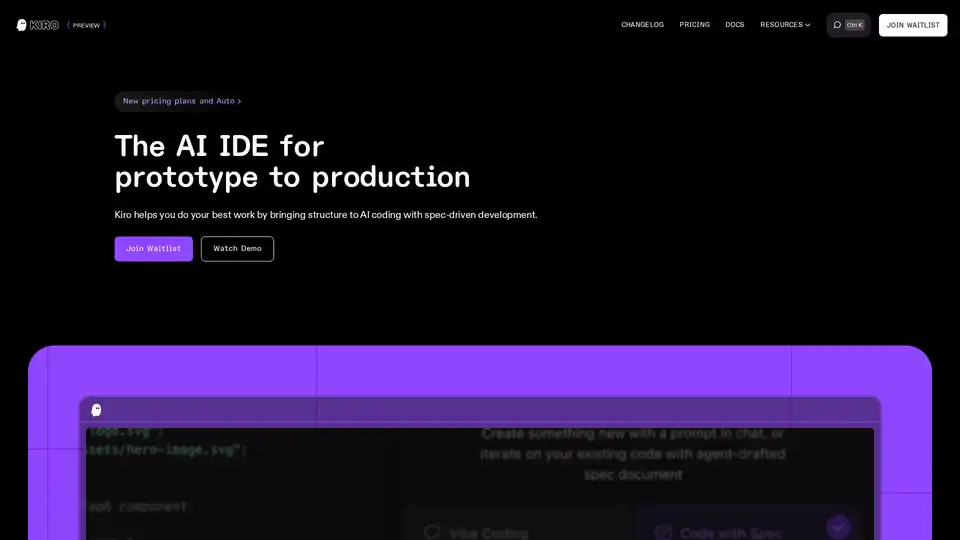
Kiro is an AI IDE that structures AI coding with spec-driven development, helping you move from prototype to production efficiently. Automate tasks and integrate tools seamlessly.
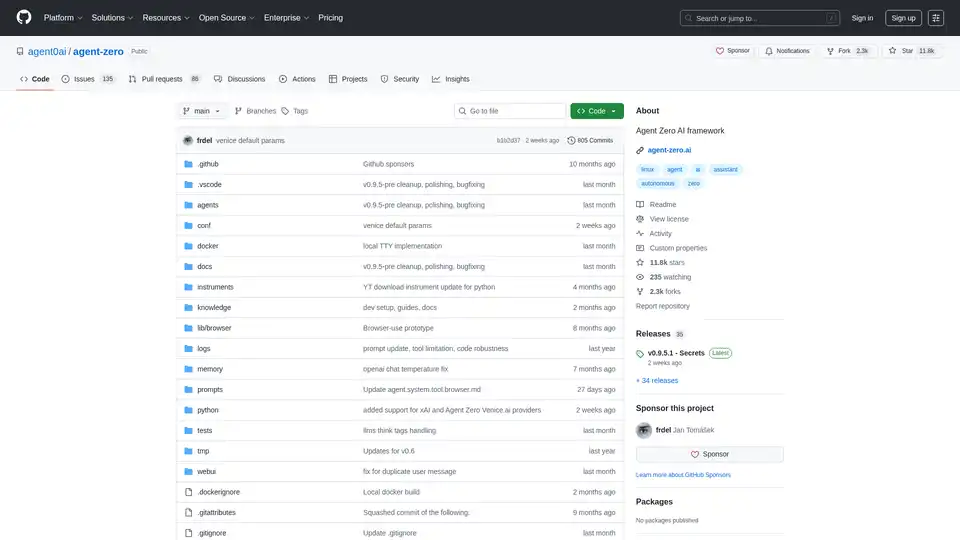
Agent Zero is an open-source AI framework for building autonomous agents that learn and grow organically. It features multi-agent cooperation, code execution, and customizable tools.
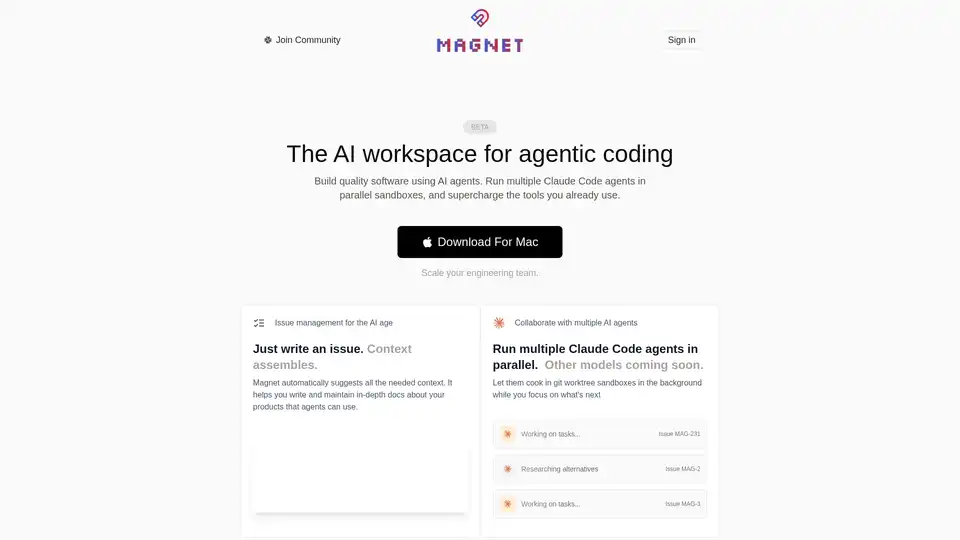
Magnet is an AI-native workspace that revolutionizes software building with Claude Code agents. Run multiple agents in parallel sandboxes, automate issue management, and scale engineering teams efficiently.
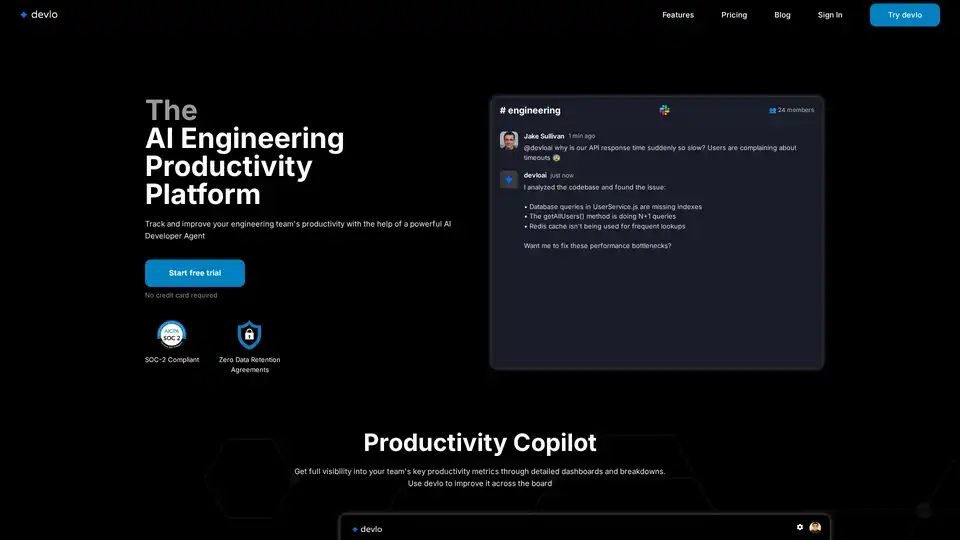
Devlo is an AI-powered platform designed to enhance engineering productivity. It offers features like AI code review, automated task delegation, and workflow automation to optimize software development.
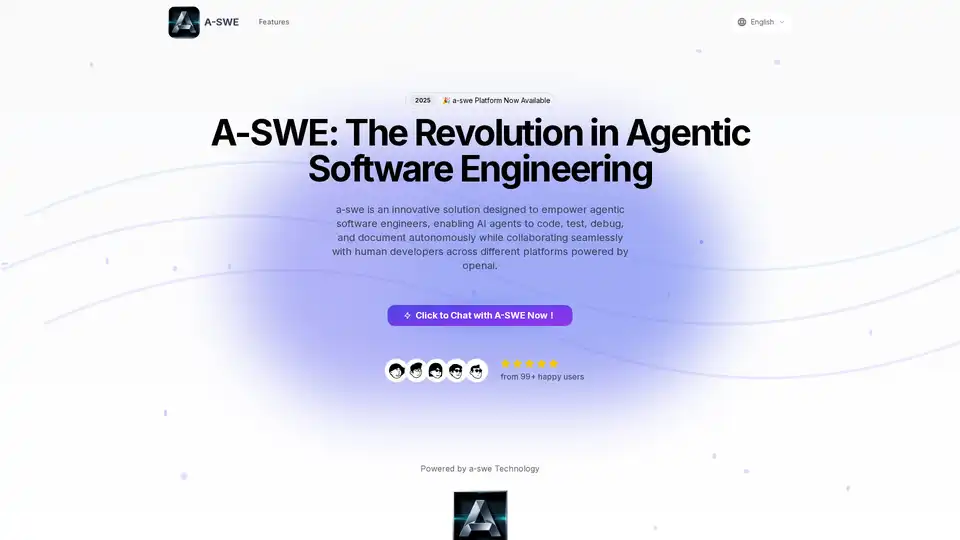
A-SWE is an AI platform designed to empower agentic software engineers, enabling AI agents to autonomously code, test, debug, and document, enhancing software development.
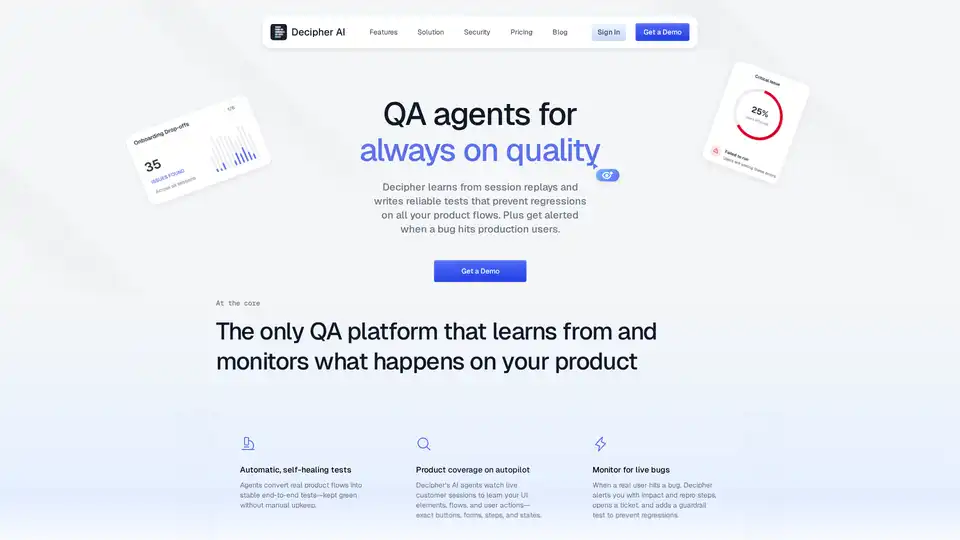
Decipher's agents learn from session replays, auto-write regression tests across every flow, and monitor production for user-impacting bugs.
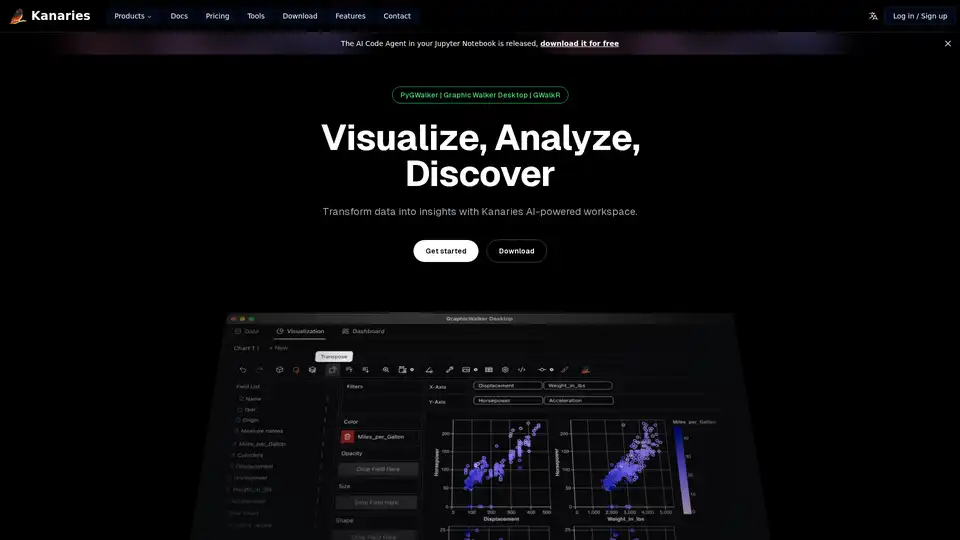
Make exploratory data analysis (EDA) easier with AI powered visual analytics. Discover, Analyze and Share data insights with ease.
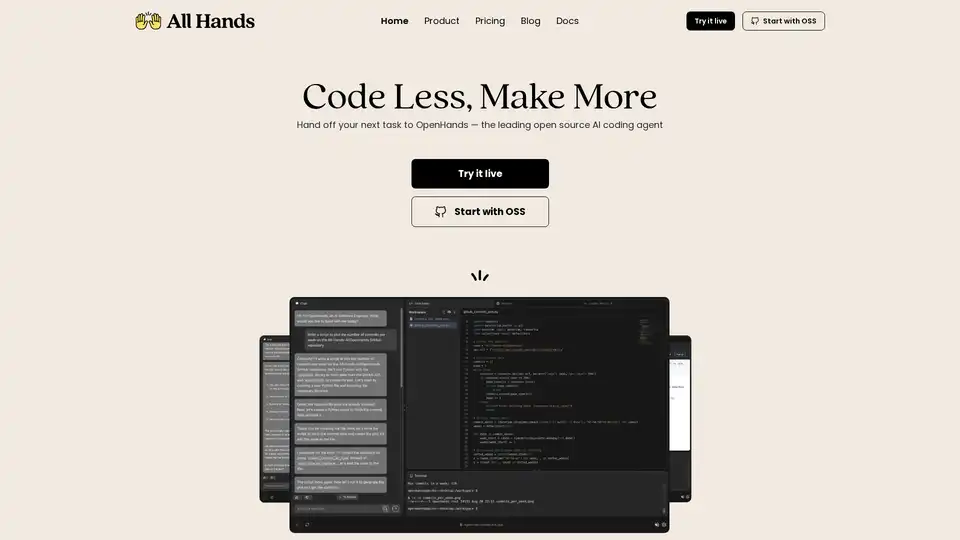
Discover OpenHands, the leading open source AI coding agent that automates code reviews, refactoring, testing, and more to boost developer productivity and reduce toil.
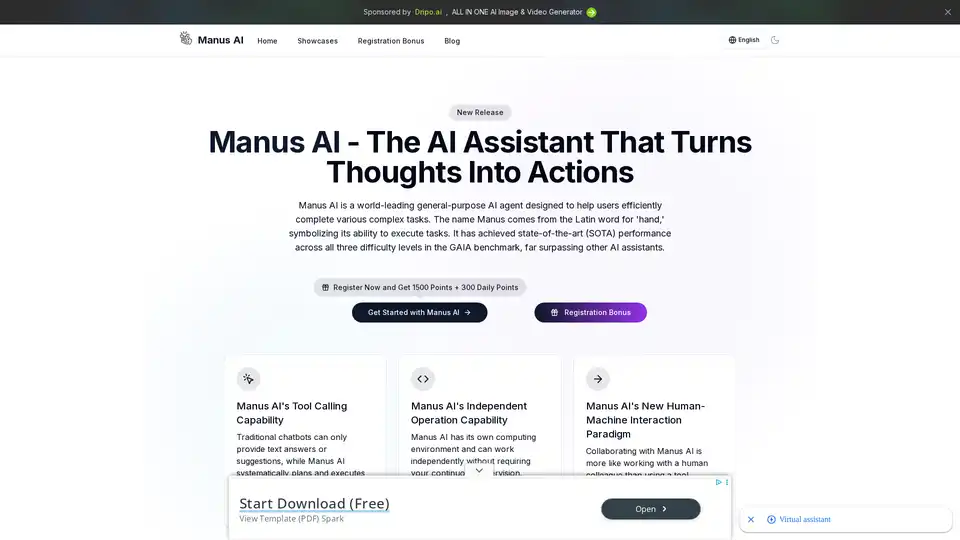
Manus AI is the world's first general-purpose AI agent launching in 2025, turning thoughts into actions with SOTA GAIA benchmark performance. It automates complex tasks like travel planning, data analysis, and content creation for efficient productivity.
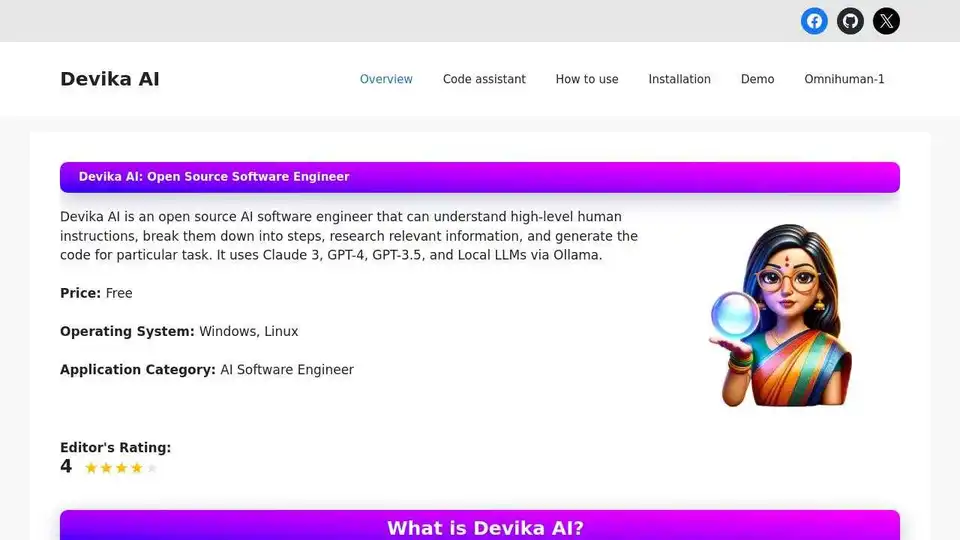
Devika AI is an open-source AI software engineer that understands high-level instructions, breaks them down, researches, and generates code using Claude 3, GPT-4, GPT-3.5, and Local LLMs.
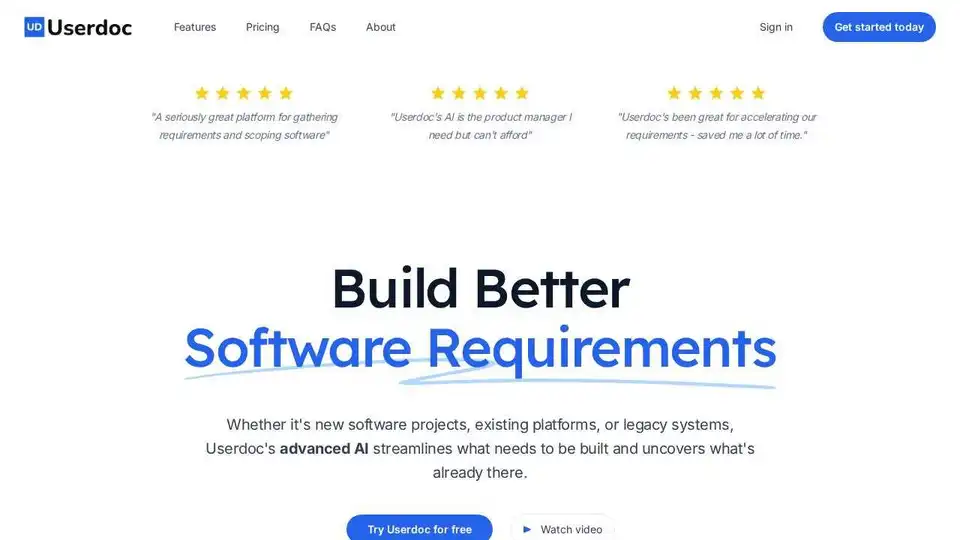
Userdoc is an AI-powered software requirements platform that helps teams build better software faster. Streamline user stories, specs, and documentation with AI.
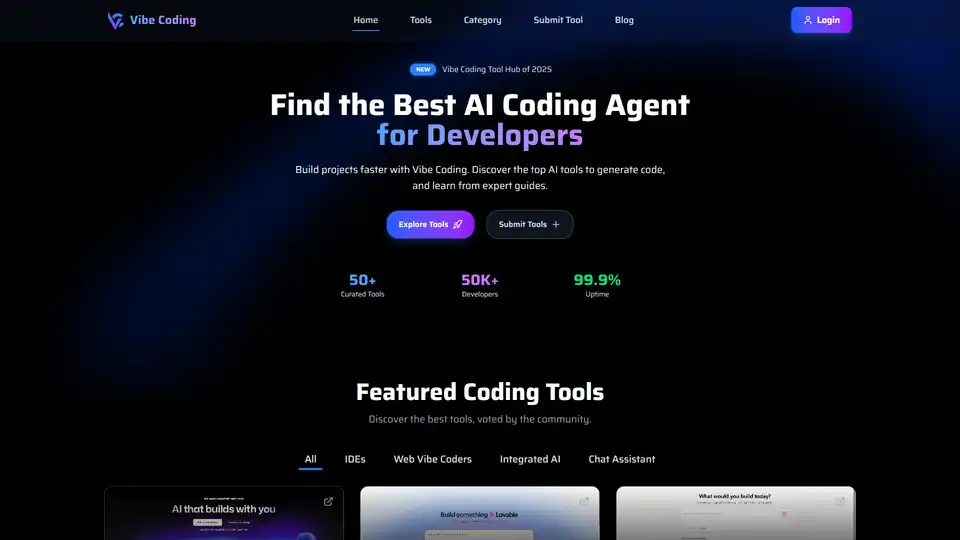
Discover Vibe Coding, a platform with AI coding tools to generate code using natural language. Explore top AI tools and expert guides to build projects faster.
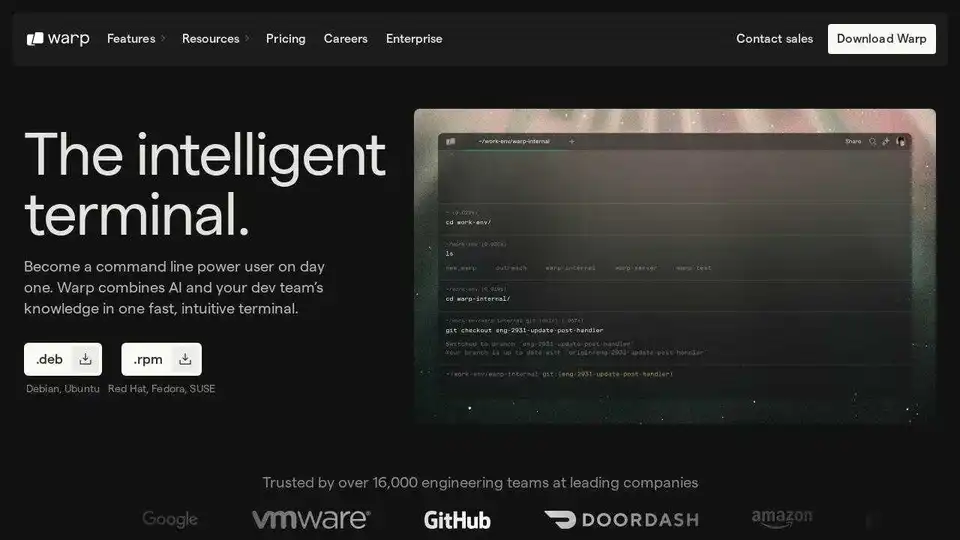
Warp is an AI agent platform that allows you to run multiple agents in parallel to complete any development task, offering a coding and terminal agent that doubles your output.
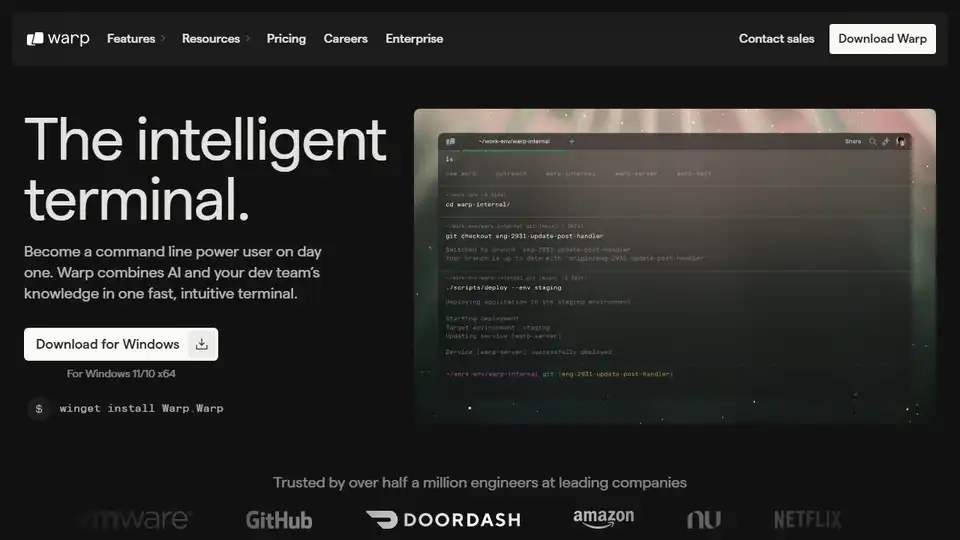
Warp is an AI agent platform that lets you run multiple agents in parallel to complete any development task. The #1 coding agent.
